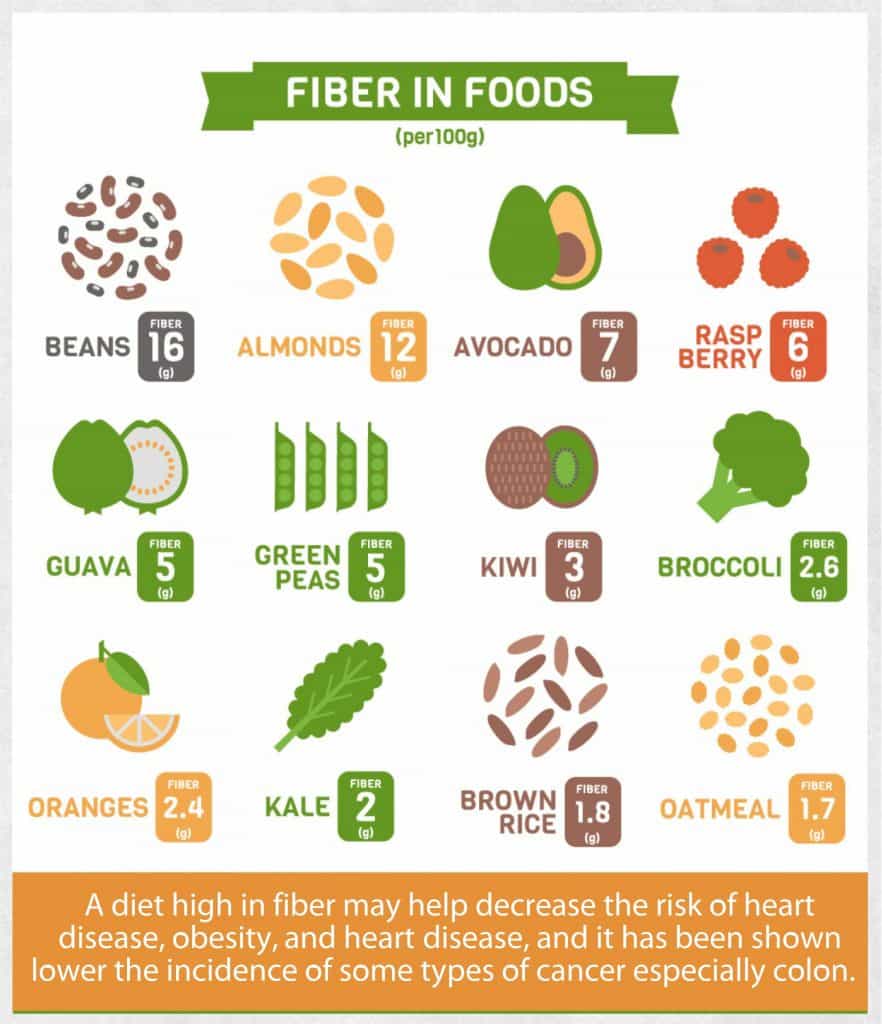What is fiber? Why do I need it? How can I add it to my diet? Read more of this article to find out everything you want or need to know about fiber.
Fiber: Why Do We Need It? What Foods Are Rich In Fiber?
Fiber is the performer, otherwise known as roughage. Simply put, it is the parts of foods that you cannot and do not digest and absorb. Fiber is mostly from the indigestible part of plant foods that pushes through your digestive system, absorbing water along the way, and easing bowel movements, and cleaning your bowels as it passes. It is essential for digestive health.
Objectives of this article:
- Explain why fiber is important
- Explain the different types of fiber
- Explain why they are important
- Give you a list of what foods are high in fiber
Importance of Fiber:
- Fiber cleans the bowels and aids in bowel motility (movement)
- Fiber prevents constipation
- Cereal grains, seeds, and fruits are high in fiber
- Fiber helps speed up the elimination of toxic waste through the colon
- Soluble fiber can reduce cholesterol levels
- Kidney beans, pinto beans, and brussels sprouts all contain soluble fiber
- The recommended daily amount of fiber is 25 g for women and 38 g for men
- Fiber reduces the rate of digestion and absorption of fats and carbohydrates
What are the types of fiber?
- Soluble:
- Soluble fiber dissolves readily in water. It changes as it goes through the digestive tract, where it is fermented by bacteria, and as it absorbs water, it becomes gelatinous.
- It can absorb cholesterol and the saturated fats that increase LDL cholesterol (bad cholesterol) levels.
- These fiber types are higher in certain grains: oatmeal, barley, and some beans.
- It slows sugar absorption; this is especially useful for people with diabetes and metabolic syndrome.
- Insoluble:
- Insoluble fiber does not dissolve in water. As it progresses through the digestive tract it does not change its form.
- Promotes regular bowel movements and prevents constipation by providing bulk to your stools
- Speeds up the elimination of toxic waste through the colon in the form of bowel movements
- By keeping an optimal pH in the intestines, insoluble fiber helps prevent microbes from producing substances that can lead to colorectal cancer.
So now you know what fiber is! But why is it needed for weight loss? Well, it isn’t needed, but it sure can make weight loss easier.
You have to love fiber. Not only will it keep your GI system running smoothly and your heart healthy, it can also keep you from outgrowing your pants. You read that correctly. Fiber is a well-known natural slimming aid that keeps your belly feeling full. While it helps you feel full, fiber has no calories so it is technically sort of free. So if you fill up on high-fiber foods and avoid those that are calorie dense, you can lose weight. I recommend 30-40 grams a day if you are trying to lose weight.
No need to slam back fiber-supplement drinks or pills to get more fiber. Instead, boost your intake by making simple trades that, at the end of the day, really add up.
What foods are high in fiber?
The bottom line: Fiber keeps you full and cleanses your bowels. I recommend you eat at least 20-25 grams a day. My goal is 25 grams.










Be the first to comment on "Nutrition Tidbit #3: Fiber"